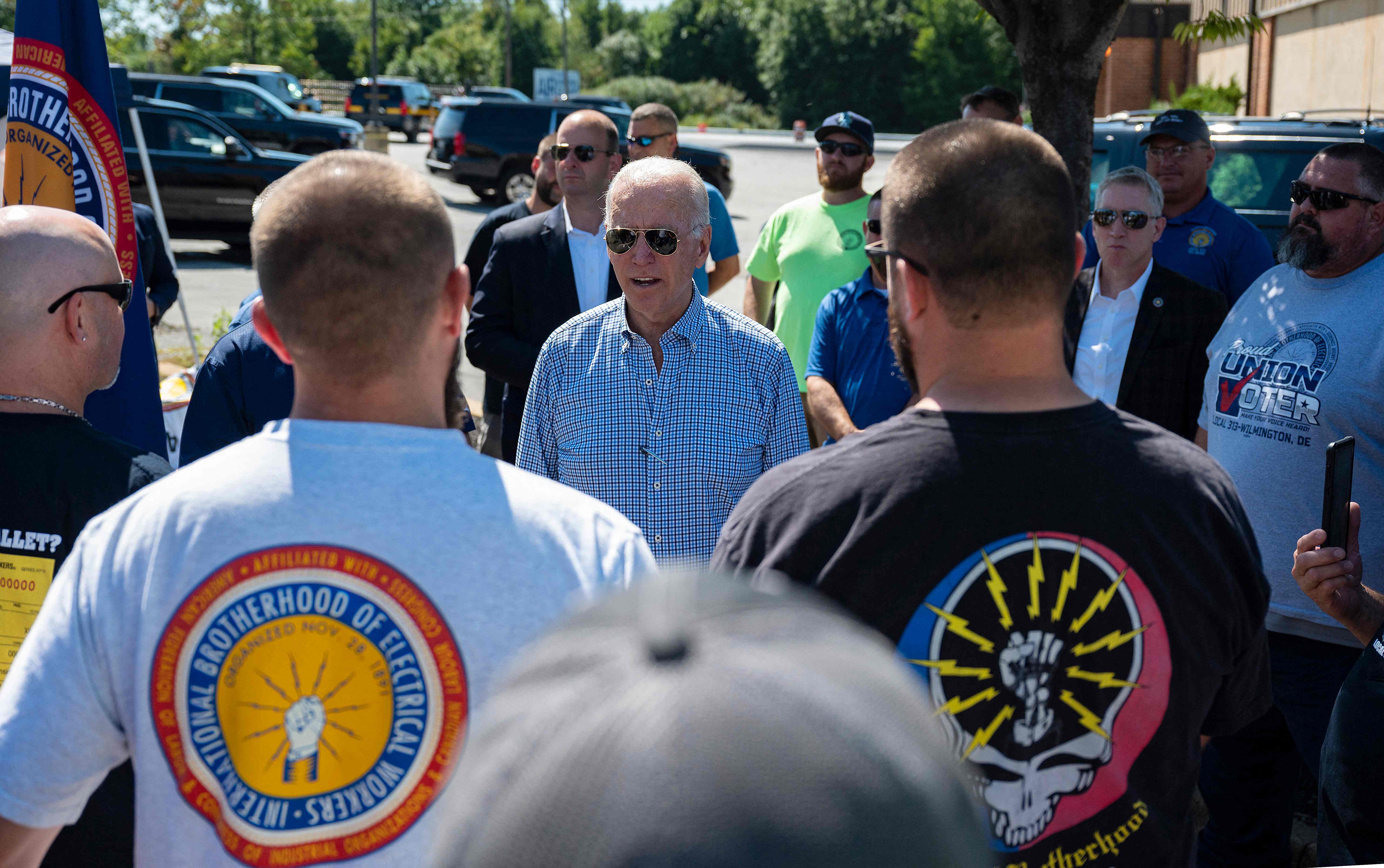Joe Biden wants to be the most pro-union president in decades. Union leaders say the bar is low
Some organised labour leaders believe the Biden presidency is an opportunity for ‘big, bold change’, writes John Bowden

President Joe Biden shared the White House stage with the newly-elected president of America’s largest labour federation this week, and vowed to be the “most pro-union President leading the most pro-union administration in American history”.
“In my White House, you’ll always be welcome. You’ll always be welcome. Labour will always be welcome,” declared the president.
The quote, which was largely drowned out by the week’s news cycle including the White House announcement a day later of a national vaccine and testing mandate to affect millions of Americans, nevertheless signalled a policy shift at the executive level that even if not backed up by legislation could have significant effects on US workplaces.
Wednesday’s event honouring America’s labour unions, at which Mr Biden was flanked by Labor Secretary Marty Walsh and AFL-CIO leader Liz Shuler, stands out as a marked shift in tone and policy towards organised labour from previous administrations of both parties, including the last time Mr Biden himself was in office.
Leaders of unions took notice, including those in attendance at the gathering.
“TY for a beautiful Labor gathering at the @WhiteHouse, @POTUS. Loved your focus on essential workers, the role of government to remove obstacles and encourage unions, the power of working people,” tweeted the Association of Flight Attendants-CWA’s Sara Nelson, who rose to national prominence during the shutdown of the federal government over the winter of 2018-2019.
Former President Donald Trump’s hostility towards labour unions was well-documented. In 2016, he famously sparred with a United Steelworkers union chief representing workers at a Carrier plant from his now-deleted Twitter account, accusing Local 1999’s Chuck Jones of doing a “terrible job” representing and bargaining on behalf of his workers.
He would go on several years later to blame another union, United Auto Workers Local 1112, for the closure of a General Motors plant in Lordstown, Ohio. In that case, the union leader personally appealed to Mr Trump to hear his side of things in letters to the White House, which were ignored by the president.
Labour leaders also found themselves disappointed with the Democratic Party after eight years of the Obama presidency, during which the US spearheaded the creation of the Trans-Pacific Partnership (TPP), a multi-nation trade deal involving nearly a dozen nations no longer counting the US, which withdrew under Mr Trump’s presidency. The TPP was widely criticised by the left and labour unions such as the AFL-CIO, which called it “likely to harm the US economy, cost jobs, and lower wages”.
Union leaders are now reacting to the White House’s shift in rhetorical stance with cautious optimism, and hoping that Mr Biden backs up his stated support for the needs of working families and the rights of organising workers with concrete action.
“It’s great to hear, right?” noted Steve Catanese, president of SEIU Local 668 in Harrisburg, Pennsylvania, during an interview with The Independent. “I think in the office of the presidency we haven’t had a long history of people who stood with organised labour.”
“We love to hear it rhetorically, but more importantly we want to see action with it,” he continued, adding: “It’s good to actually have a partner in the white house that wants to address” the needs of working families.
Mr Catanese would go on to describe the Biden presidency, and in particular the upcoming infrastructure reconciliation bill, as avenues where making “big, bold change” was possible.
Democrats are currently having an inter-party battle among their Senate caucus as to whether the $3.5 trillion bill will make it through the reconciliation process unscathed; it faces the eye of the parliamentarian, which the party’s leaders have refused to override, as well as potential defections of conservatives in the party, most notably Senators Joe Manchin and Kyrsten Sinema. The bill is highly unlikely to pick up even a single Republican vote, and therefore will require the total unity of the Democratic Senate majority to pass.
This week it was revealed that some language from the PRO Act, a piece of pro-union legislation being pushed by many progressives, is included in the current iteration of the reconciliation bill, including the parts that protect striking workers from being permanently replaced as well as a provision that adds the potential for civil penalties for violations of the National Labor Relations Act.
The inclusion, if it were to stay in the bill’s text, would represent a serious concrete policy gain for organised labour and as a result unions are pushing hard for Democratic leaders to not cave to the complaints of conservative party members.
“I would be extremely disappointed if we didn’t see parts of the PRO Act pass”, added Mr Catanese.
More than that, he said, Mr Biden should reverse the hands-off or even hostile approaches that previous White House administrations have taken towards the labour movement.
‘’If someone in the presidency feels comfortable saying drop the union, it’s OK to say join the union,” he said.






Join our commenting forum
Join thought-provoking conversations, follow other Independent readers and see their replies
Comments